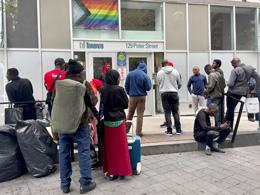Canada’s Border Bill Guts Refugee Rights

By Mata Press Service
Canada’s proposed border security legislation, Bill C-2, is facing fierce backlash from human rights groups, refugee advocates, and opposition MPs who say the sweeping bill undermines the fundamental right to seek asylum and mimics hardline U.S. immigration policies.
At the heart of the outcry is what critics describe as an “alarming shift” in Canada’s refugee and immigration stance—one that risks eroding international obligations, trampling civil liberties, and scapegoating migrants under the guise of national security.
“Seeking asylum is a human right,” said Ketty Nivyabandi, Secretary General of Amnesty International Canada’s English-speaking branch.
“With Bill C-2, the Canadian government threatens to chip away at that right... This attack on the right to seek asylum will severely diminish Canada’s international standing when it comes to protecting human rights.”
Tabled this month, the proposed legislation introduces measures that would:
Bar most refugee claims made more than one year after a person first entered Canada;
Disqualify refugee claims made by migrants who cross the Canada-U.S. border irregularly and wait more than 14 days to apply.
Give the immigration minister sweeping powers to cancel visas, permits, and applications at will, based on vaguely defined notions of “public interest.”
Critics argue that these changes could retroactively deny protection to thousands of individuals, including long-term residents, students, and workers, while also contravening Canada’s Charter of Rights and international refugee obligations.
The Canadian Council for Refugees (CCR) warns that Bill C-2 dangerously conflates asylum seekers with public safety threats.
“Under the guise of a bill that claims to make Canada safer,” the CCR said, adding “the government is introducing sweeping legislative changes that will seriously weaken refugee rights.”
“The bill appallingly treats refugees as if they were in the same category as fentanyl or illegal weapons,” CCR continued. “This rhetoric and these policies have no place in a country that prides itself on opening its doors to people seeking refuge.”
Opposition MPs have expressed concern that Bill C-2 reflects a sharp turn toward Trump-style enforcement tactics.
“It seems to me… this piece of legislation is Canada’s attempt to mimic some of those measures that the United States is adopting,” said B.C. NDP MP Jenny Kwan.
“I never thought that this day would come where Canada would go down that road.”
Kwan pointed to the bill’s provision allowing the cabinet to cancel or suspend immigration documents without judicial oversight, a move she said could result in mass cancellations with no accountability. “I don’t accept that the Liberals say, ‘Don’t worry, we’re the good guys, so trust us.’ That is just not acceptable.”
Julia Sande, a lawyer with Amnesty International, echoed that concern: “People give up their entire lives, in some cases, their life savings… And so to have the government be able to pull the rug out from under wide groups of people is concerning.”
She also questioned the vague language in the bill, which allows the minister to act if “in the public interest”—a phrase she says opens the door to abuse. “What’s in the public interest? In the fall, we saw migrants and refugees being scapegoated for the housing crisis.”
Under current law, people who cross the U.S.-Canada border irregularly can still file for refugee protection if they wait 14 days before submitting a claim. Bill C-2 would eliminate that option for many, while imposing retroactive restrictions on those who arrived after June 2020 and did not file within a year.
Amnesty International says this violates the principle that asylum should remain accessible to those whose circumstances change, such as people who later face persecution due to political activity, sexual orientation, or gender identity.
The only recourse for many would be a Pre-Removal Risk Assessment (PRRA), which lacks the procedural safeguards of a refugee hearing, including the right to an oral hearing, an appeal, or an independent decision-maker.
“This last resort… is not equivalent to the robust and independent refugee claim process managed by the Immigration and Refugee Board,” said the CCR.
The bill also proposes removing inactive cases, making removal orders immediate upon withdrawal of a claim, and authorizing the government to suspend refugee hearings if the claimant is outside Canada.
Immigration Minister Lena Metlege Diab has defended the legislation as a necessary modernization effort that enhances security and border integrity.
“We’re improving security at the Canada-U.S. border and making our immigration and asylum systems stronger, more flexible, and responsive to new and developing pressures,” Diab said in a press release.
She said the new powers are intended to deal with “one-off” events like pandemics or exceptional circumstances, and that “Canadians should feel safe that we are putting in all these safeguards.”
Canada has experienced a sharp rise in refugee (asylum) claims in early 2025, with more than 28,880 applications filed in just the first quarter. A particularly notable trend is the increasing number of international students seeking asylum. In the first three months of 2025 alone, 5,500 international students submitted refugee claims—a 22% increase over the same period in 2024.
Key Provisions of Bill C-2
• Makes refugee claims ineligible if not filed within one year of entry (retroactive to June 24, 2020)
• Disqualifies claims from migrants crossing irregularly and waiting more than 14 days
• Grants ministers the power to cancel immigration documents and suspend application processing
• Allows the government to pause or cancel applications without a refund or recourse
• Facilitates inter-departmental sharing of personal immigration data
• Shifts asylum decisions exclusively to cases where the claimant is in Canada









